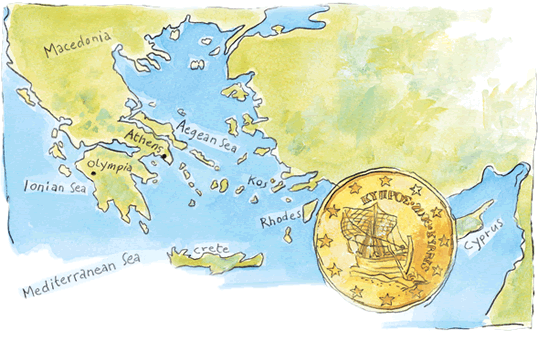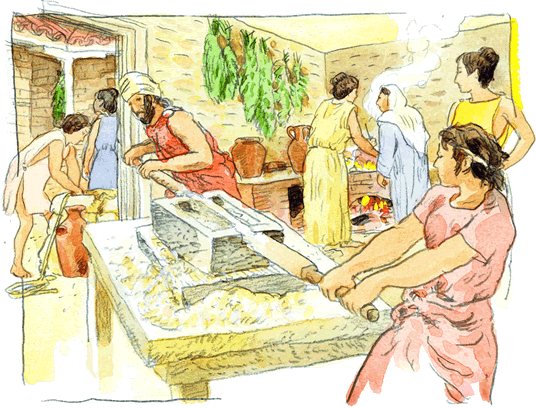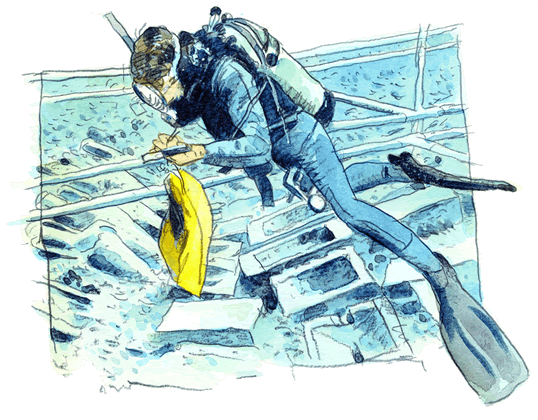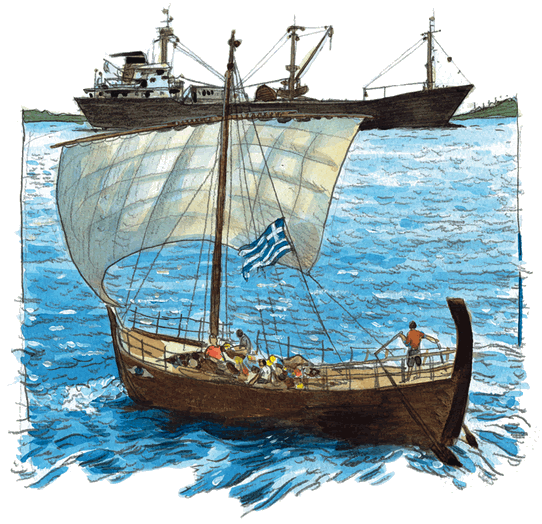![Ship’s Log: Maiden voyage, Month of Agrianios in the Second Year of the 98th Olympiad [Late Spring, 387 BC]](images/tramp/log01.gif)

Making all of three knots [5.6 kph] along the idyllic coast of Little Asia, I am in a desperate panic to slow down. My Greek crew of four does not share my misgivings about such alarming speeds, but their cool confidence affords me no comfort. Always in a hurry, they are aptly called the human race. Lumber, on the other hand, should do just that.
It is not easy for a thing of the forest to become a thing of the sea. My timbers of Turkey oak and Aleppo pine never imagined they would give shape someday to the world’s most advanced machine—a merchant ship under sail. Fast, to a tree, means solidly rooted to the soil, immovably fixed. To a cargo vessel with its slippery footing on the foamy waters of Poseidon’s realm, fast apparently means something else. Wood, I decide, should make the acquaintance of sister Water without the unwelcome company of uncle Wind. Right now, one of us needs to leave. As I struggle for composure, I fear that I cannot manage my new assignment. I feel too unsteady, unsure, unworthy of the task. I hate to admit it, but I doubt I will survive another day out here on the Mediterranean Sea.
![Ship’s Log: Nearing Athens, Month of Karneios in the Third Year of the 113th Olympiad [Summer, 326 BC]](images/tramp/log02.gif)
I have come a long way since that first daunting voyage some 60 years ago. No longer a jittery debutante afraid of a little water and wind, I am now a workaholic woman of the world with more sailing experience than any of the men aboard. For 15 quadrennial olympiads, as the game-crazed Greeks like to reckon time, I have scudded from port to port, stitching together the ragged coastlines of three continents. My thickening logbook reads like an atlas of historic places—some majestic with age (Thera), some recently devastated by war (Tyre), and others too new yet to know if they will ever be remembered (Alexandria in Egypt). I know well every island in the Aegean, every harbor on the mainlands of Greece and Little Asia and even the many seaport cities of Cyprus, Syria and beyond. I have careened through howling gales above 30 knots, shedding no more than a rudder or two, and I have long outlasted my first fine crew, and the sons of their sons as well.
I love my life as a sea tramp—but don’t you dare take that word the wrong way. I have integrity and respect, earned every day from doting crewmen willing to defend my honor. I notice how they hush their bar-room boasting whenever they come aboard, as if I were their watchful mother. I keep them at their prayers on stormy evenings; I also show them how to have good fun. At sea, no matter how laden with cargo or late with delivery, we take pleasure in the play of dolphins near my bow. I offer a happy roost for relays of interesting shore-birds, and tickle at the squirm of octopi and fish pulled aboard to feed my hungry crew. When my lads go ashore, I try not to worry. Instead, I amuse myself in many ways: the babble of languages at every port, the merciless haggling of dockside merchants, the strutting of customs officials and tax assessors among the money tables, the exotic products and occasional passengers waiting at every shore for a tramp like me to ferry them a little farther along from Egypt or Lebanon or Crete.

 Each sailing season from late spring to early autumn, I blissfully bargain between wind and waves for the salaries of the men who depend on me. My Skipper and his three mates must cram into close quarters, since I am mostly undecked and only 14 meters (45' 6") long, with a beam just one-third of that. To provide for both their livelihood and their living quarters, there is scarcely a place to stand on me except the bow and stern. At each port, the Skipper takes on consignments of one kind or another, hauling whatever can be safely stowed aboard. At the moment, my cargo is 20 metric tons of African grain headed for the hungry citizens of Athens; they, like many other Greeks, are suffering a dire food shortage following several years of crop failure. Fortunately, that boy from Macedonia has just conquered the Persian Empire and thus opened up rich areas like Egypt as a ready source for our daily bread. Many frustrated Greeks naturally blame the gods for creating this food crisis, but I say, give the gods credit for creating Alexander.
Each sailing season from late spring to early autumn, I blissfully bargain between wind and waves for the salaries of the men who depend on me. My Skipper and his three mates must cram into close quarters, since I am mostly undecked and only 14 meters (45' 6") long, with a beam just one-third of that. To provide for both their livelihood and their living quarters, there is scarcely a place to stand on me except the bow and stern. At each port, the Skipper takes on consignments of one kind or another, hauling whatever can be safely stowed aboard. At the moment, my cargo is 20 metric tons of African grain headed for the hungry citizens of Athens; they, like many other Greeks, are suffering a dire food shortage following several years of crop failure. Fortunately, that boy from Macedonia has just conquered the Persian Empire and thus opened up rich areas like Egypt as a ready source for our daily bread. Many frustrated Greeks naturally blame the gods for creating this food crisis, but I say, give the gods credit for creating Alexander.
Normally I carry burdens of wine and small luxury items rather than grain, but most anything will
do. Empty ships fill
no purses. I keep fairly close to land and leave the big loads and open waters to vessels that carry 165 tons or so and are specially designed for long hauls. No one my size likes to tie up next to one of those floating monsters in port, but they will never put me out of business: Few investors envy the risks they pose. Since about a third of all cargoes sink, my loss could be tolerated, whereas the wreck of a single supership can instantly bankrupt a lot of unfortunate people. By dividing a major shipment into small consignments distributed among several modest coast-huggers like me, bankers and wholesalers can stay afloat even if one of their rented ships does not. So far, I have made everybody happy by keeping my hull off the bottom of the sea.
![Ship’s Log: Port of Rhodes, Month of Bodromios in the Second Year of the 118th Olympiad [Winter, 307 BC]](images/tramp/log03.gif)
Moored among so many fresh faces, I try vainly to recall the names of the many ships with whom I have shared the sea. I just don’t have the rigging for it, as they say of us tired and forgetful tramps. I seem to remember lots of Apollos and Aphrodites, since sailors can suddenly get religious when about to christen a new boat, and plenty of nostalgic home-port monikers like Syracusia
or Alexandria. Here and there I’ve met vessels longingly named Eirene [Peace] or Thalia [Wealth], but men forget that Poseidon covets those things, too. He has dragged them down one by one
to his undersea collection. Someday, soon I suspect, these new-berthed ships bobbing beside me will be wondering what I was called. None will recollect rightly, of course—then some young wag will make up a name like Rhapte [Patched Together] to set
the whole dock giggling.
In fairness, I suppose I do look about as rhapte as a ship can get. Extensive repairs have kept me in service these 80 years. Besides
a few bumps, most of my damage results from a lifelong battle against the dreaded Teredo navalis, an insatiable mollusk that bores into a wooden ship en masse like underwater termites. These so-called shipworms riddle every vital organ, from keel to strakes. Occasional scrapings and fresh coats of pitch have helped
a little, but twice I have been hauled out for major surgery. Lately, like a leaky pot, I have been patched inside and out with sheets of lead. In fact, my entire hull has been sheathed with metal laid over
a matting of agave leaves and pitch. Held in place by thousands of copper tacks, this stopgap shields my aging timbers from Teredo. My worried crew keeps a mallet and two rolls of lead sheeting stowed on board for further emergencies. I am
an old lady on life support, but I am
not ready to retire.
![Ship’s Log: Near Kos, Month of Paramos in the Fourth Year of the 118th Olympiad [Summer, 305 BC]](images/tramp/log04.gif)
I labor in seas frothed by the ambitions of very powerful men. Almost 20 years ago the boy-king who conquered Persia suddenly died and left his empire sprawled like a meaty carcass among carnivores. Alexander’s salivating generals immediately set upon each other for the prize; the fighting and feasting continue still. The only difference these days is that the wars have spilled into my waters. You see, Alexander had been a lad with no real navy and a novel idea—to win the sea by land. His great victories, all gained on solid ground, rendered the Mediterranean useless to the Persian fleet. Now some of his successors have taken the opposite tack: Win the land by sea. Demetrius, the son of Alexander’s general Antigonus, has just parlayed a naval triumph into a claim of kingship for both himself and his father, even though they have no actual territories to rule. Demetrius thinks his kingdom might come when his will be done at sea. We shall know soon enough if he is right.
Only a few miles from here, Demetrius’s armada has invested my home port of Rhodes, the largest base for merchant vessels
in this part of the Mediterranean. Like good businessmen, we Rhodians have tried to remain neutral throughout the wars for Alexander’s empire, but our robust economy has become the envy of all and the objective of ‘King’ Demetrius’s 200 warships. Built
for bone-crushing battles using ship-to-ship battering rams and powered by the synchronized muscle of at least 170 oarsmen each, these galleys give me nightmares. Over my years I have watched warships grow bigger and bigger, from the old “threes” throttled by a triple stack of rowers to the “fours,” “fives,” “sixes” and more
of a mindless maritime arms race in this post-Alexander world. Any one of those ships could crash right through me without knowing I was there.

Densely crewed battleships require lots of logistical support, so Demetrius brought along 170 auxiliary vessels to fortify his attack on Rhodes. Civilian tramps like me normally stay clear of such
operations, but about a thousand private merchant ships have also signed on to help supply Demetrius’s forces. I refuse to join them,
of course; I cannot betray my country. Anyway, I’m too old for
that sort of thing. With everybody—even the pirates—answering Demetrius’s call, I have plenty of work to do. Maybe, in a way, the battle for Rhodes is keeping me in business beyond my years. Someone has to haul everyday loads like the pile of millstones waiting for me at Kos. At present speed, I should dock there in about an hour.

![Ship’s Log: North coast of Cyprus, Month of Dalios in the Fourth Year of the 118th Olympiad [Autumn, 305 BC]](images/tramp/log05.gif)
The lovely little harbor of Kyrenia just drifted out of sight to starboard, and I am creaking along comfortably just one kilometer [0.6 mi] offshore. A few more stops and then my crew will strike northward again for Little Asia to see if it is safe yet to return home. The crisis at Rhodes has worried my crew while they’re away away from those troubled waters. Last we heard, the siege still had our city in its deadly grip, but maybe the situation will improve as winter approaches.
After departing Kos eight weeks ago, the Skipper and his lads coaxed my old timbers safely through the Sea of Icarus to offload my cargo of millstones at Samos Island. Those heavy grinders were hopper types, made from matching blocks of volcanic stone, that crush the grain between their fitted surfaces. Mismatched millstones function poorly, so the 29 odd-lot blocks that were part of the consignment could not be sold. The Skipper simply kept them as ballast, lining the bottom of my cargo bay in long, neat rows among the stones and gravel already there.
Atop this ballast ride layers of tall, two-handled amphorae, the ubiquitous shipping crates of Mediterranean commerce. These heavy clay vessels with their one pointed foot are like the ships that carry them—too ungainly to stand upright on land but perfect for traveling the seas. Their special shape allows the amphorae to nestle on board in secure stacks; they are virtually indestructible and hold about 26 liters (7 gal) each. My current freight of 404 amphorae contains marketable wines picked up at various ports. To this potable tonnage the Skipper has just added a shipment of 10,000 Cypriot almonds, tied in sacks wedged tight among the amphorae. Besides the crew and their belongings, I could not possibly hold anything more. Maybe that ship rowing out to meet us wants to see if we have any trade goods to unload for the villagers nearby. I hope so; my sore ribs could sure use a little lightening of this cargo….
![Ship’s Log: Seabed off Cyprus, Month of Dalios in the Fourth Year of the 118th Olympiad [Autumn, 305 BC]](images/tramp/log06.gif)
Pirates! The scoundrels swarmed us before I realized the danger, not that I could ever have outrun them so heavily laden. I suppose they spotted us riding deep with cargo so close ashore, and couldn’t resist the opportunity for a bit of “commerce,” as they choose to call it. Truth is, not much separates legitimate trade from piracy these days: Often the same ship will be engaged in both, conducting normal business unless a smaller undermanned vessel offers an easy target in some secluded spot. After 80-odd years of sailing, I finally became their victim. The Skipper and I assumed such villains would all be away on Demetrius’s payroll at Rhodes, not hiding among the coves of Cyprus to prey upon tramps like me. Fatal mistake.
I remember the fast approach of their ship and the volley of spears that struck us before we could even surrender. The four men aboard me had nowhere to hide, and I took eight hits myself. Several iron spear-points from the bloody assault remain lodged in my wrinkling skin, a painful reminder of my last frantic moments afloat. The pirates took captive the wounded survivors, to be ransomed or sold into slavery, then they quickly ransacked me for what little I had to offer: the personal valuables of my unfortunate crew, the season’s accumulated purse and a slosh of wine to celebrate. I was judged unworthy of towing just a few hundred meters to shore for a more thorough pillaging, so my assailants simply hacked a hole in my hull to scuttle me forever.

One moment I had 30 meters (100') of seawater below me, and the next I had 30 meters overhead: That’s the small but essential difference between a ship and a shipwreck. My heavy cargo sped my final plunge downward, breaking my back when I struck
bottom. I listed to port in the roiling sand and swirling Poseidon grass, my bow facing north, as if I might yet attempt the next leg of my long journey home to Rhodes.

![Ship’s Log: Seabed off Cyprus, Month unknown, in perhaps the First Year of the 245th Olympiad [ad 201]](images/tramp/log07.gif)
Time plays tricks down here, but I figure that I’ve been waiting at least 500 years for a salvage crew to find me. I may just give up soon. Most of my amphorae have leaked out their well-aged wines
(I like to think that Homer’s famous description of the “wine-dark sea” represents the spillage from old tubs like me) and I don’t hold out much hope that my briny almonds are worth eating now that the sacks have rotted away. The same is probably true of the other consumables my crew had stashed in the sail locker on board: olives, figs, grapes, garlic, lentils, pistachios, hazelnuts, and sprigs of (once) dried herbs. Of course, I have taken good care of the cookware and such that the lads used for food preparation. I get sentimental every time I count through their eating utensils (plates, spoons, cups, jars, jugs) all neatly preserved in multiples of four. I guess their families never knew what happened to these poor fellows, or where to come to gather up their things.
What’s left of me lies safely under a protective blanket of soil, sand, and sea-grasses, not to mention the tons of cargo pinning me here. Guess I’m fast again, in the
arboreal sense of the word. For a
while the teredo worms feasted on
my exposed timbers, especially my
upraised starboard hull, until silt and sediments from the nearby coast covered my rotting bones. With nowhere to go, I spend lots of time recording in this logbook the exciting news of another manta ray, squirrelfish or grouper passing overhead.
![Ship’s Log: Seabed off Cyprus, Month unknown in perhaps the Second Year of the 686th Olympiad [1967]](images/tramp/log08.gif)
The bubbling man-thing reappeared today, bringing with
it for the first time others of its species. These creatures, half human and half fish, seem excited to see me lying here; I’m awfully curious about them as well. They all have bulbous backs, finned feet, huge glassy eyes, and mouths perpetually clogged by the coils of some eely parasite. If these beasts could communicate,
I wonder if I would hear anything like the sonorous languages of my youth, or the grunts and squeaks of some new life-form. Have survivors from Plato’s sunken Atlantis finally found me? Do Greeks as handsome as their gods still walk on dry land? Are there any forests left? Or ships?
The bubblers do not linger to provide any answers. As they swim away, I suddenly feel the suffocating loneliness of my centuries undersea. Maybe I have imagined it all.


![Ship’s Log: Kyrenia, Month of Hyakinthios in the Fourth Year of the 686th Olympiad [Summer, 1969]](images/tramp/log09.gif)
Schools of the creatures have swarmed back for the past two years, slowly revealing themselves to be real-life men and women on a mission to free me from Poseidon’s grasp. Wearing something called scuba in their odd but very human language, they are making a new science of me that they call “nautical archeology.” I must say, I like the attention. Turns out, these folks had been looking for me—well, maybe not for me personally, but for a well-preserved ancient ship like me that could be excavated scientifically. A Cypriot sponge diver, that first bubbler I saw, showed excited archeologists where he had discovered my grave. Since then, scuba-scholars have excavated me piece by piece from the ocean floor, recognizing in my misfortunes a rare opportunity to fill a huge gap in maritime history. Experts tell me that I’m the oldest Greek ship to be raised from the sea, with an astonishing 75 percent of my wooden hull still intact. I am like a waterlogged encyclopedia of ancient seafaring, waiting to be read.
As shipwrecks go, I’m about
as rare as an unplundered royal tomb in Mesopotamia or Egypt —though I suppose there was a
little pilfering in my case: For a while a greedy grave robber kept spoiling the excavations in sector 6A of my underwater sepulcher, until the scuba-scholars nabbed him red-tentacled. The culprit was an octopus living in one of my amphorae. “Octo,” as they christened the rascal, liked to prowl my cargo and stash whatever loot he could carry (dishes, a wooden spoon, an iron chisel, almonds) in the neck of a broken pot. Thanks to the excavators, Octo has moved on—and I am moving too, plank by plank, to the shores of sunny Cyprus.
![Ship’s Log: Kyrenia Castle, Month of Sminthios in the Third Year of the 696th Olympiad [Spring, 2008]](images/tramp/log10.gif)
Today I live in a castle, as I deserve. Modern visitors flock to my side in this cozy museum at Kyrenia, Cyprus yearning to glimpse my now-glamorous curves. I have starred in several television shows, appeared in books and magazines, put my face on a new Euro coin, and dazzled surfers on some ocean called the Internet. In my honor, two full-scale replicas have taken sail, assuring my legacy as though this old lady of the sea had given birth at last. And best of all, I finally heard the good news that Demetrius never did capture my home port of Rhodes. I suppose it’s fitting that instead of his great warships, the envy of the age, a little
Rhodian tramp like me is the one survivor to be seen today. Poor Demetrius never won a kingdom on land by conquering the sea, but I sure did—castle and all.
 |
Frank L. Holt (fholt@uh.edu) is a professor of history at the University of Houston and most recently author of Into the Land of Bones: Alexander the Great in Afghanistan. He is writing another book on ancient Afghanistan. This is his fifth article in the "I Witness History" series. |
 |
Norman MacDonald (www.macdonaldart.net) is a Canadian free-lance artist, living in Amsterdam, who specializes in history and portraiture. This is the fifth article he has illustrated in the series. |
This article appeared on pages 18-23 of the January/February 2009 print edition of Saudi Aramco World.
Check the Public Affairs Digital Image Archive for January/February 2009 images.